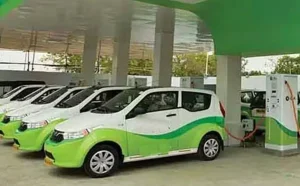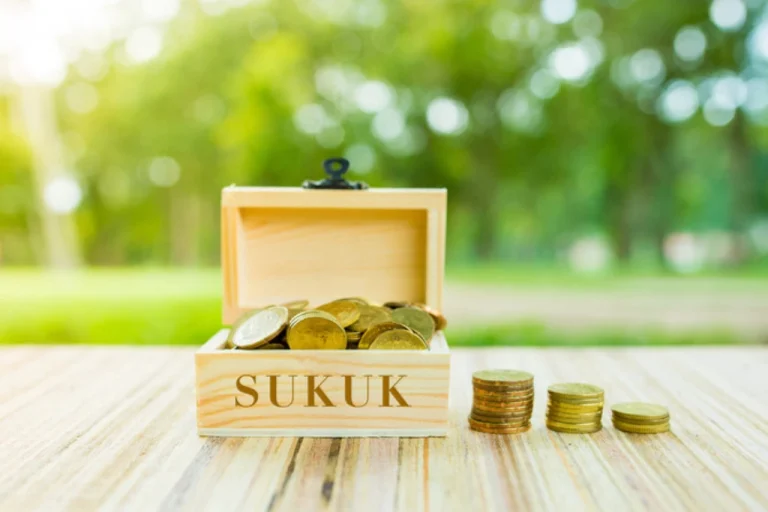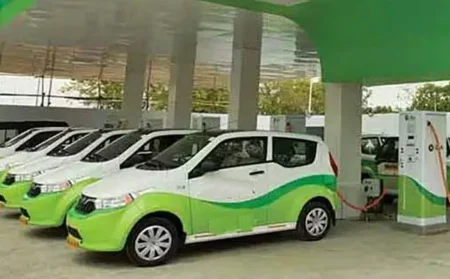In a major first for the country’s financial landscape, K-Electric has introduced Pakistan’s first retail Sukuk to be listed on the stock exchange — a unique Islamic investment tool aimed at raising funds in a way that fully complies with Shariah principles. This Sukuk offers public investors an opportunity to participate in a running business based on profit and loss sharing, following Islamic financial principles.
This retail Sukuk marks a turning point for Pakistan’s Islamic financial market. Built on the Musharaka (Shirkat-ul-Aqd) framework, it brings investors directly into the business as partners — allowing them to earn profits or bear losses based on real performance, in line with Shariah principles.
Key Highlights of the Sukuk Issue
| فیچر | تفصیلات |
| Issuer | K-Electric Limited |
| Total Size | Up to PKR 3,000 million (inclusive of green shoe option of PKR 1,000 million) |
| Shariah Structure | Musharaka (Shirkat-ul-Aqd) – Joint venture profit/loss sharing model |
| Face Value | PKR 10,000 per Sukuk Certificate |
| Minimum Investment | PKR 50,000 (i.e. 5 certificates) |
| Tenor | 1 Year |
| Profit Payment | Monthly (with Tier 1 and Tier 2 profit classification) |
| Profit Modes | Direct bank credit or electricity bill adjustment (for KE consumers) |
| Tradability | Tradable on Pakistan Stock Exchange (PSX) |
| Redemption | Full amount credited to bank account at end of tenor |
| Unsecured Status | Investors rank after secured creditors in repayment hierarchy |
| SPV Requirement | No Special Purpose Vehicle needed due to direct Musharaka investment |
Shariah Certification & Oversight
The product has been certified as Shariah-compliant by Mufti Ali Asghar, a prominent member of Central Ruet-e-Hilal Committee and SECP-registered Shariah advisor. The issuance is further backed by Islamic Economics Centre (Darul Ifta Ahl-e-Sunnat).
The Sukuk structure has been reviewed and approved to comply with the principles of Musharaka Shirkat-ul-Aqd, meaning investors become equal partners in the business venture conducted by K-Electric using the raised capital. Any profit or loss generated will be shared accordingly.
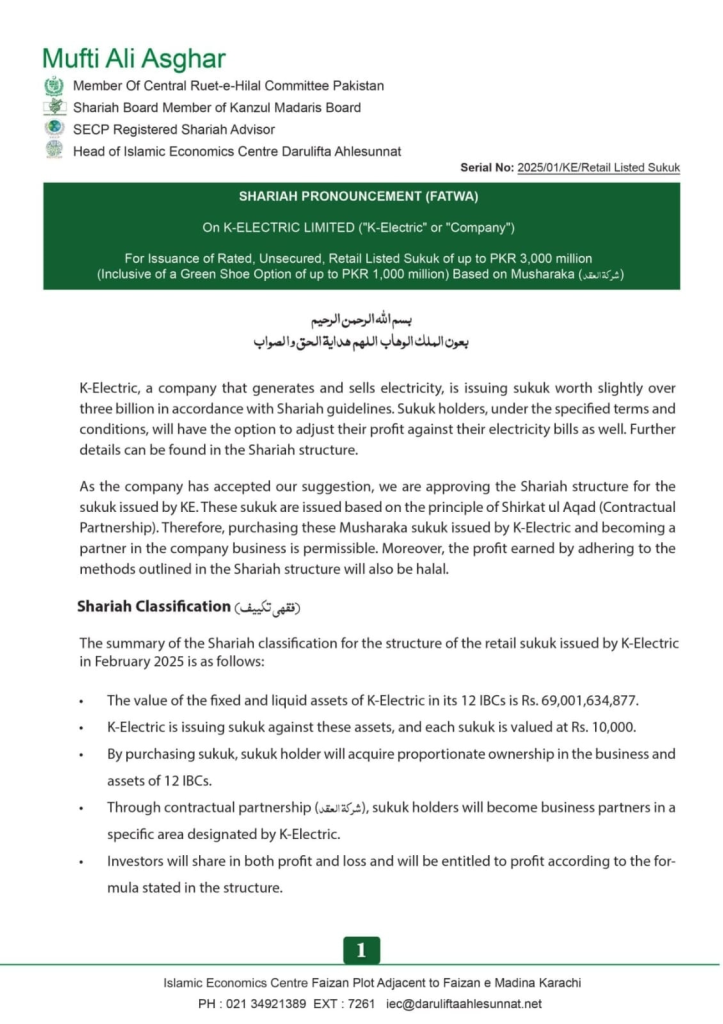
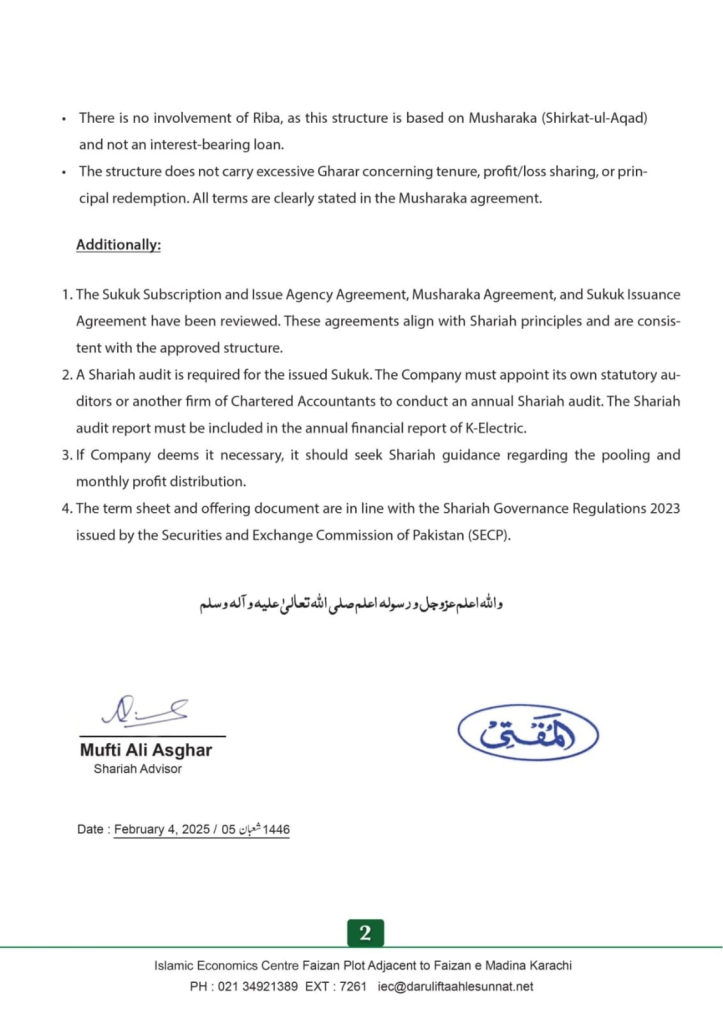
Tiered Profit Distribution Mechanism
1. Tier 1 Profit:
Investors will receive monthly provisional profit payments, starting one month after the issue date. These payments are fixed under a predetermined ratio.
2. Tier 2 Profit:
Any profit above the Tier 1 ceiling will be treated as Tier 2. As per Shariah guidelines, this excess will be donated to charitable institutions, under the supervision of Shariah advisors, rather than distributed to investors.
Mode of Profit Distribution
Investors can choose between two payment modes:
- Monetary Credit: Profit will be transferred to the bank account of the investor.
- Electricity Bill Adjustment: KE consumers can opt to have the monthly profit amount directly adjusted in their electricity bills, offering a unique saving benefit.
Note: Only KE account holders in Karachi are eligible for the bill adjustment option, but investment is open to all, including overseas Pakistanis.
Investment Process in Sukuk
- Announcement: K-Electric officially launched the Sukuk on July 28 via their website and social media.
- دستیابی: Application forms will soon be available at selected banks.
- CDS Account: Interested investors must open a CDC (Central Depository Company) account via their bank.
- Tradability: Investors may sell their Sukuk holdings through the Pakistan Stock Exchange at any time during the year.
Why This Sukuk Matters
- It’s a Shariah-compliant alternative to traditional fixed-income instruments.
- Offers higher returns than many bank profit rates.
- The unique benefit of electricity bill adjustment adds practical value for Karachi residents.
- Encourages financial inclusion by allowing small-scale investors to participate in large-scale energy projects.
- Helps bridge the gap between Islamic finance and real-world business operations.
Key Differences Between Sukuk and Bonds
| فیچر | Sukuk | Conventional Bonds |
| Based on | Asset ownership, partnership, or lease | Debt obligation (loan with interest) |
| Returns | Profit sharing or rental income | Fixed or floating interest payments |
| Shariah Compliance | Yes – no interest, speculation, or gambling | No – usually interest-based |
| Underlying Asset | Must be linked to tangible assets | No asset backing required |
| Risk Sharing | Yes – shared profit and loss | No – bondholders are creditors only |
Also read this: Gold Prices Dip Slightly as Global Market Cools Down

